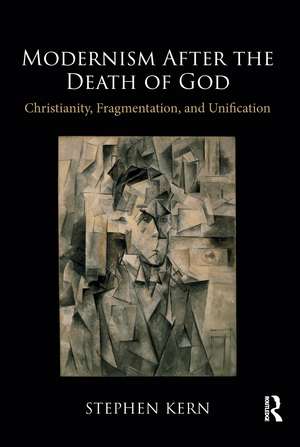Modernism After the Death of God: Christianity, Fragmentation, and Unification
Autor Stephen Kernen Limba Engleză Hardback – 22 noi 2017
Preț: 765.59 lei
Preț vechi: 1028.23 lei
-26% Nou
Puncte Express: 1148
Preț estimativ în valută:
146.53€ • 158.17$ • 122.87£
146.53€ • 158.17$ • 122.87£
Carte tipărită la comandă
Livrare economică 19 aprilie-03 mai
Preluare comenzi: 021 569.72.76
Specificații
ISBN-13: 9781138094031
ISBN-10: 113809403X
Pagini: 202
Ilustrații: 1
Dimensiuni: 178 x 254 mm
Greutate: 0.53 kg
Ediția:1
Editura: Taylor & Francis
Colecția Routledge
Locul publicării:Oxford, United Kingdom
ISBN-10: 113809403X
Pagini: 202
Ilustrații: 1
Dimensiuni: 178 x 254 mm
Greutate: 0.53 kg
Ediția:1
Editura: Taylor & Francis
Colecția Routledge
Locul publicării:Oxford, United Kingdom
Public țintă
Postgraduate and UndergraduateCuprins
Introduction: From Christian unity to modernist unification
Chapter 1. Friedrich Nietzsche: greatness, meaning, and authenticity
Chapter 2. James Joyce: wholeness, harmony, and radiance
Chapter 3. Sigmund Freud: psychoanalysis and psychosynthesis
Chapter 4. D. H. Lawrence: spontaneous-creative fullness of being
Chapter 5. André Gide: wholly available to life and love
Chapter 6. Martin Heidegger: pursuing the question of Being
Chapter 7. Virginia Woolf: creating shape out of chaos
Conclusion: A modernist ideal type
Chapter 1. Friedrich Nietzsche: greatness, meaning, and authenticity
Chapter 2. James Joyce: wholeness, harmony, and radiance
Chapter 3. Sigmund Freud: psychoanalysis and psychosynthesis
Chapter 4. D. H. Lawrence: spontaneous-creative fullness of being
Chapter 5. André Gide: wholly available to life and love
Chapter 6. Martin Heidegger: pursuing the question of Being
Chapter 7. Virginia Woolf: creating shape out of chaos
Conclusion: A modernist ideal type
Notă biografică
Stephen Kern is a Humanities Distinguished Professor in the Department of History at Ohio State University. His publications include The Culture of Time and Space 1880–1918 (1983); The Culture of Love: Victorians to Moderns (1992); A Cultural History of Causality: Science, Murder Novels, and Systems of Thought (2004), and The Modernist Novel: A Critical Introduction (2011).
Descriere
Modernism After the Death of God explores the work of seven influential modernists. Friedrich Nietzsche, James Joyce, D. H. Lawrence, André Gide, and Martin Heidegger criticized the destructive impact that they believed Christian sexual morality had had or threatened to have on their love life. Although not a Christian, Freud criticized the negative effect that Christian sexual morality had on his clinical subjects and on Western civilization, while Virginia Woolf condemned how her society was sanctioned by a patriarchal Christian authority. All seven worked to replace the loss or absence of Christian unity with non-Christian unifying projects in their respective fields of philosophy, psychiatry, or literature. The basic structure of their main contributions to modernist culture was a dynamic interaction of radical fragmentation necessitating radical unification that was always in process and never complete.
